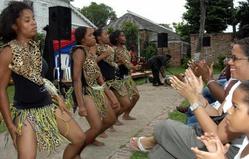
Members of the Innswood High School drummers perform during the Jamaica Bicentenial Committee Drumming Festival commemorating the bicentenary of the abolition of the transatlantic trade in Africans at Devon House, St. Andrew, on Sunday. - Ian Allen/Staff PhotographerLack of early stimulation in the home has been found to be the root cause of learning disabilities affecting children who are seen at the Mico College Child Assessment and Research in Education (CARE) Centre.
Clinical psychologist Ghia Townsend says this trend became evident during home investigations conducted by the centre's social workers.
"Based on trends found by social workers among many of the kids, there is inadequate stimulation and exposure in the home," Townsend said recently.
"Some kids are underachieving and not performing although they are intellectually capable."
Explaining the extent of the problem, she said that, "when we talk about stimulation, when you ask parents 'Are you assisting your child with homework? What kind of educational materials do you have at home? Are you reading with this child? Are you counting with this child?' These are the parents who will say, 'No, we have not done this'."
In most cases, the school is the only source of stimulation these children receive, she said, pointing out that, "when there is inadequate stimulation in the home, the school alone will not help".
In fact, Townsend said many children with learning disabilities, when assessed, have (shown) strengths that can be drawn on to help them. A child, who has had little or no stimulation, however, will have nothing to draw on, she notes.
Secondary to the problem of inadequate stimulation are deep-seated social and behavioural problems that are causing many students in mainstream classrooms to underperform at school.
Violent home environment
"Emotional disturbances, poor diet or eating habits, a violent home environment and abuse, all factor into why children can find it very difficult to focus in school as well," says social worker and clinical psychologist Dr. Keturah Wilson.
Dr. Wilson is one of two social workers who conduct assessments and run parenting workshops at the centre. These workshops, she says, "are geared towards helping parents deal with the learning difficulties that their children face," noting that many parents do not have the expertise they need to help them overcome their difficulties.
Two types of parenting workshops are held by the centre each quarter: large workshops, which accom-modate more than 60 parents and two small workshops that facilitate no more than 10 parents.
The parenting workshops, Dr. Wilson says, are making an impact on parents based on the feedback she receives.
"The parents' response has been excellent and they have been finding the programme helpful," she said.
-JIS

